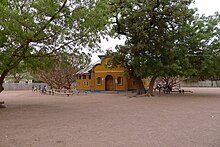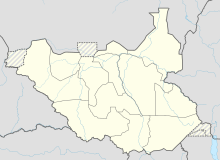Rumbek
Coordinates: 6 ° 49 ' N , 29 ° 41' E
Rumbek ( Arabic رمبيك, DMG Rumbīk ) is the capital of the state of Western Lakes (until 2015 of the state of Lakes ) in South Sudan .
location
The city is centrally located in South Sudan, around 220 km northwest of Bor . The environment consists of tree savannah in which acacias predominate. Sorghum , millet and cassava are planted in the red clay fields .
population
Rumbek has 33,428 inhabitants (2007 calculation). The majority of the residents are Dinka who, in addition to farming, also raise cattle. Christian proselytizing began in the region shortly after 1900. Rumbek has been the Roman Catholic bishopric since 1974 . Since the end of the civil war in South Sudan in 2005, numerous traders have lived in the city, the majority of whom are Muslim and in 2008 applied for permission to build a mosque. The city has grown massively since the peace agreement, mainly due to foreign workers from neighboring countries.
Population development:
| year | Residents |
|---|---|
| 1973 (census) | 17,748 |
| 1983 (census) | 19,399 |
| 2007 (calculation) | 33,428 |
| 2011 (estimate) | just under 300,000 |
history

In 1857, the French trader Alphonse de Malzac established a station for trading in ivory here. He is said to have paid the wages for his negotiators in the form of slaves . Rumbek is said to have been the first fortified Arab military camp (Arabic zariba ) in South Sudan. After de Malzac's death in 1860, Franz Binder took over the business. The slaves and the ivory were brought to the Nile and on by sailing ships to Khartoum . Emin Pascha came through the city in 1881 and released several hundred of the slaves gathered here in freedom. In 1885 Rumbek was conquered by supporters of the Mahdi during the Mahdi uprising . During the British colonial period, which lasted until 1956, Rumbek was the seat of a District Commissioner . There were some churches and mosques.
On May 1, 1997, Rumbek was captured by the SPLA during the civil war , the 600 government soldiers stationed in the city fled to Juba or Bor. After that, Rumbek was bombed several times by the Sudanese army . After the peace agreement in 2005 between the government in Khartoum and the SPLA, Rumbek was the interim capital of South Sudan for one year. Juba has been the capital since early 2006.
Cityscape
There are no paved roads in the city, and the airfield is also unpaved. Rumbek is a center for numerous development aid organizations. Most of the goods are brought from Kenya by truck and stacked in newly built storage rooms. The organization of the infrastructure measures in the city must be negotiated between the helpers and representatives of the SPLA.
Individual evidence
- ↑ Manyang Mayom: Muslims celebrate Eid Al-Adha in Rumbek. Sudan Tribune, December 11, 2008
- ↑ a b c Michael Hesse: Before the storm. In: Frankfurter Rundschau . January 10, 2011, accessed January 11, 2011 .
- ↑ Page no longer available , search in web archives:
- ↑ Douglas H. Johnson: The Nuer Civil Wars , in: Günther Schlee, Elizabeth Watson (Ed.): Changing Identifications and Alliances in Northeast Africa: Ethiopia and Kenya , 2009, ISBN 978-1-84545-603-0 , pp. 33
- ↑ Marc Engelhardt: Soon Darfur will be everywhere. TAZ, May 31, 2008

